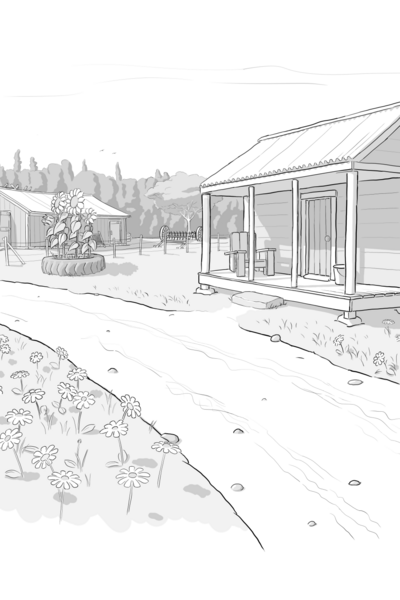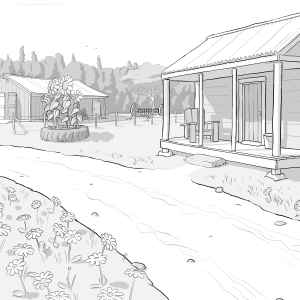My father was a carter from Sevastopol. Driving a cart had been easy money in the eighties, so by the nineties, competition was fierce. My father took any work he could get, including jobs that took him to remote places. It was on one such trip, two days north of the city, that he met my mother.
“Are there no carters here?” Asked my father.
“No. but if there were, he would have enough work at harvest time to support him the whole year.”
“This village is lovely...”
I was born the following spring.
The village, on a tributary of the Volga, was too small to support many tradesmen, and so my father learned to fix his own carts. He was a good woodworker, and quickly evolved from cartwright to carpenter, something that gave our family an elevated status in a community of farmers. Our home was sophisticated by local standards, and contained a shelf of books. A picture book of renaissance art was my favorite.
At 11, I began as apprentice to my father. I had no natural skill, but I was the only male child, and so I would have have to do. I was neither especially smart, nor attractive, but a good family, and career prospects made me marriageable. I envisioned a future in which I and my pretty wife would establish an urbane household. We would build a sturdy house on high ground, where there would be framed artworks and a whole wall of books.
***
I was still a minor when war came, and so I thought I might make it through without becoming a participant. I recognized my feelings as ignoble, and I joined my peers at playing war games, but I never had their enthusiasm for valor.
“Aren’t you excited” Said my friend Grigory, as we waited in ambush under the old creek bridge.
“I guess so” I replied. Grigory’s biggest fear was that he would be exempted from service because he bruised easily, and his second biggest fear was that he would get through without at least one bullet in him.
The war was unprecedented both in magnitude and duration, and youth did not save me from conscription. There was political unrest, though, and this gave me hope that the war would be over before I got out of training.
“Four weeks is all we get?” I said to one of my fellow conscripts.
“You expected more?” he replied with forced humor “How much training do you think it takes to run over open ground towards machine guns?”
He must have seen the panic in my face, and he kindly added:
“Don’t worry man, how can you take an enemy seriously when he wears a pointy helmet?”
Life at the front was the worst sort of misery. The shelling was constant, and I found myself wishing that I would fall ill, however my body, normally so infirm, would not cooperate. What ultimately saved me was the deep, loose soil of the region, which rendered the trenches unstable.
“Does anyone here have training as a woodworker?” A sergeant holding a toolbox addressed my assembled company. I was only in the second year of an apprenticeship that I had not taken seriously, but I raised my hand. The need for carpenters was dire, and I was accepted based solely on my word, and on my ability to identify each of the tools, and to state its use.
The first wall I built collapsed on me, sparing me from even the relative safety of life in the company construction detail. When the others dug me out, they found I was I was badly gashed and bruised by the splintered remnants of my retaining wall, and so after just three weeks at the front, I wound up in a field hospital.
I was scarred all along my right side, but none of the wounds was deep, and I was again fit for service in less than four weeks. I knew the engineers would not want me back, and I thought I was finished for certain. I would be cut down by machine guns, but not before I faced a disgraceful return to my old company.
As the nurse approached my bed, I prepared myself for the worst. My only hope was that I might be assigned to a new company, thus making the last weeks of my life less embarrassing, but the news was unexpected. The seriousness of my scars, one of which extended impressively above my collar, had earned me a reprieve, and got me sent home.
Poor logistics, and general turmoil caused my return trip to take more than four months, and so the brevity of my service was not noted. I resumed my apprenticeship and my life.
***
Grigory returned several months later, having seen much more action than I had. He is the only person to whom I confided my unimpressive military career, but he was not judgmental. Mostly, I kept quiet about my time at the front, and let my scars do the talking. I had never liked being seen shirtless, but now I did not mind so much, letting war wounds fill the role normally taken by muscles and chest hair.
The postwar years were happy ones. I never became a great carpenter, but I was a passable assistant, and my father was a wizard with wood. The business grew, and the village grew to a town, and in my mid twenties, I began to woo Olga.
After a year’s pursuit, Olga consented to marry me. I think she was less taken by me, than by my talk of the sturdy house I would build.
***
A month after Olga and I married, both of my parents died in an epidemic of typhoid, so I never got the opportunity to build my house.
My first year of marriage was difficult, as I struggled to keep alive the family business, and to keep satisfied a woman who I knew was hoping for more. Without my father’s skill, fewer people brought work to the shop, so in my spare time, I built a small shed in the yard. I told Olga that this structure was practice for the promised house. She was kind, and encouraged my enthusiasm, but it was clear that this shed was nothing but proof of my inability to build a house. The next year, Olga died while pregnant with our first child.
It was at this time that I began to drink, though the lack of money helped to moderate my consumption. Just outside of town there were some men who ran a homemade distillery. Their product could be had for a tenth of the cost of ordinary vodka, but I had heard stories about the dangers of moonshine.
The community was supportive of me, and I was offered several jobs, however I turned them all down, as I still fancied myself a tradesman. People brought work to me in pity for my situation, but it was obvious that many of them had taken to doing their own carpentry. Nobody did this work in my presence, but a new porch or shed would appear, and everyone simply acted as if it had always been there.
I accepted that I was not skilled as a carpenter, but felt that my true strength was as a designer. I hoped to invent some new type of furniture, and regularly presented my creations to any willing audience. The most successful of these creations was a chair built from the parts of a cabbage crate. The townspeople were ever supportive, and many of them had one of these chairs, and at least when I visited, it was always displayed prominently in their house.
Even if my work was as brilliant as I imagined, The Soviet Union in the thirties was no place to get noticed as a furniture designer. Year after year I lived in my shop on the slow trickle of commissions, and on high hopes for my next design.











Comments (0)
See all